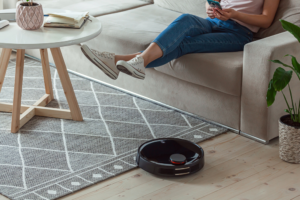Technology continues to evolve and make our lives simpler and when it comes to cleaning, most people will take the more convenient route. Robot vacuums have been available for many years now with many variations and mixed capabilities, but are they really as helpful as people believe? This Canstar Blue guide will break down some of the pros and cons of robot vacuums and help you decide whether they’re really worth the money.
Advertisement
What is a robot vacuum?
A robot vacuum is a self-managed and autonomously run appliance that vacuums your floor for you. Many models have sensors that help determine the best cleaning path in the space and others can be remotely controlled via an app. Many models of robot vacuum have additional features like a cliff sensor so they don’t tumble down the stairs and detangling capabilities so wads of hair don’t get caught in the brushes or wheels.
Do robot vacuums work?

Whether robot vacuums work can come down to personal preference but based on their capabilities, they do work. There are a number of brands that have now brought out robot vacuum models ranging from entry level appliances with the bare minimum functions, to top of the range appliances that have the latest technology to help improve their capabilities.
Are robot vacuums worth it for pet hair?
For those with furry friends who unfortunately shed, they understand the pain of constant vacuuming or sweeping and how quickly pert hair builds up. Having an autonomous machine that can take care of that for you is ideal. Robot vacuums allow you to have a ‘set-and-forget’ mentality when it comes to vacuuming. Some models will have designs more specific to pet hair and cleaning, so always keep an eye out for those models if you’re specifically looking to use it to clean pet hair.
How long do robot vacuums last?
On average, robot vacuums last approximately four to six years. This time frame will entirely depend on a number of variables including how you take care of your vacuum, how often it is used, how often you clean your vacuum and so on. Proper maintenance on your robot vacuum, such as cleaning the filters and updating the compatible app (if it has one) will help keep your robot friend running on all cylinders.
Robot vacuum pros and cons
While robot vacuums are a very handy appliance and have a number of great features, they do have some setbacks. Some pros and cons of robot vacuums are:
Pros:
- Can clean hard to reach places: due to their compact size, they are capable of slotting under the couch or table with ease and cleaning spaces untouched for some time.
- Come with handy features: Many robot vacuums will include features like time scheduling, app remote control and more, allowing you to set and forget while it tackles the cleaning.
- Help keep pet hair under control: You can clean more regularly without thinking about it and keep your pet’s hair from building up.
Cons:
- Expensive: unfortunately, robot vacuums can be more expensive than a standard vacuum model, making them a sizeable investment.
- Can get stuck: although they have sensor technology, if cords are left around or have floor-length curtains, the vacuum can suck them up and get caught.
- Can be expensive to fix: due to their initial cost being more, their maintenance costs can be more expensive also. If you need new parts, they may need to be ordered in and fixed by a professional.
How much do robot vacuums cost?
Robot vacuums can cost from $400 to upwards of $3,000 in some cases. What you pay for in an entry level model will be basic features and, in some cases, not as much suction power, whereas the pricier models will have more added features and tend to have a stronger motor for cleaning.
Who sells robot vacuums?
Brands like Dyson, iRobot, Ecovacs, Roborock and Samsung all have models of robot vacuums available at a range of price points. If you don’t wish to buy direct from the brand you can find them at retailers like The Good Guys, Harvey Norman or Appliances Online.
Should I get a robot vacuum?
Whether or not you choose to buy a robot vacuum comes down to personal preference. If you’re a busy person who doesn’t have time to vacuum a couple of times a week, then a robot vacuum could be for you. On the other hand, if you’re unable to fork out upwards of $500 for an appliance then an entry level standard vacuum may be a suitable choice. If you’re uncertain about buying a robot vacuum but are after a standard vacuum, compare brands below.






Share this article